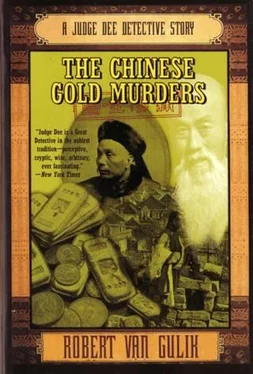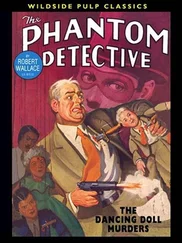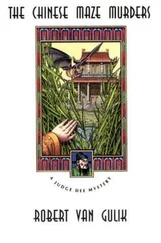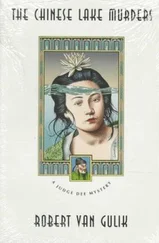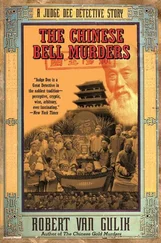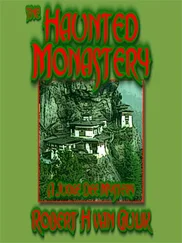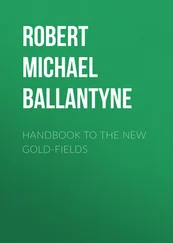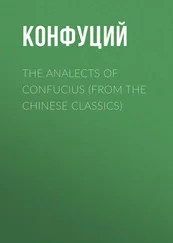Just as he was about to step inside, Ma Joong halted. A shrill voice came to them over the dark water. A falsetto sang, "Moon, oh silvery moon-"
A small boat was being sculled toward the Watergate. The singer sat in the stern, slowly waving his arms up and down to the rhythm of his song.
"That's our drunken poet, Po Kai, going home at last!" Ma Joong growled. "Better give him time to get in ahead of us."
As the piercing voice began again, he added grimly, "At first I thought it awful. But believe me, after that howl we heard in the wood, his song sounds pretty good to me!"
A RICH SHIPOWNER REPORTS THE LOSS OF HIS BRIDE; THE JUDGE RECONSTRUCTS A MEETING OF TWO PERSONS
Judge Dee was up long before dawn. He had felt exhausted on his return from the temple, but he had slept very badly. Two times he had dreamt that the dead magistrate was standing in front of his couch. But when he had woken up, drenched with perspiration, the room had been empty. At last he had risen, lighted a candle and sat at his desk, looking through the district files till the glow of dawn had reddened the paper windows and the clerk had brought him his morning rice.
When the judge laid down his chopsticks Sergeant Hoong came in with a pot of hot tea. He reported that Ma Joong and Chiao Tai had gone out already to supervise the repairing of the watergate, and to investigate the bank of the canal where they had witnessed the attack in the mist. They would try to be back in time for the morning session of the tribunal. The headman of the constables had reported that Fan Choong had still not shown up. Finally, Tang's servant had come and said that his master had had an attack of fever during the night, but would come as soon as he felt somewhat better.
"I am not feeling too well myself," Judge Dee muttered. He greedily drank two cups of hot tea, then went on. "I wish I had my books here now. There exists quite an extensive literature on ghostly phenomena and on weretigers, but unfortunately I never paid special attention to it. A magistrate can't afford to neglect any branch of knowledge, Hoong! Well, what did Tang tell you yesterday about the program for the morning session?"
"There isn't much, your honor," the sergeant replied. "We must announce the verdict in a dispute between two farmers regarding the boundary of their fields. That is all." He gave the judge a dossier.
While glancing through it Judge Dee remarked, "Fortunately, that appears quite simple. 'Fang has done a good job locating in the land registry that old map where the original boundaries were clearly indicated. We'll close the session as soon as we have dealt with this case. There are many more pressing affairs!"
Judge Dee rose and Sergeant Hoong helped him to don his official robe of dark green brocade. As the judge was exchanging his house bonnet for the black judge's cap with the stiffened wings, three beats on the large gong resounded through the tribunal, announcing that the morning session was about to be opened.
The judge crossed the corridor in front of his office, passed through the door behind the unicorn screen, and ascended the dais. As he sat down in the large armchair behind the bench he noticed that the court hall was crowded. The people of Peng-lai were eager to see their new magistrate.
He quickly checked whether the court personnel were in their appointed places. On either side of the bench, two clerks were sitting at lower tables, making ready their ink stones and writing brushes for taking down the proceedings. Below the platform, in front of the bench, six constables stood in two rows of three, with their headman by their side. He slowly let his heavy whip swing to and fro.
Judge Dee rapped his gavel and declared the session open. After he had finished the roll call, he turned to the documents that Sergeant Hoong had spread out on the bench. He gave a sign to the headman. Two peasants were led before the bench and quickly knelt down. The judge explained to them the tribunal's decision on the boundary problem. The peasants knocked their foreheads on the floor to express their gratitude.
The judge was about to raise his gavel for closing the session, when a well-dressed man stepped forward. As he limped to the bench, supporting himself on a heavy bamboo stick, the judge noticed that he had a rather handsome, regular face, with a small black mustache and a well-trimmed, short beard. He seemed about forty years old.
He knelt down with some difficulty, then spoke in an agreeable, cultured voice.
"This person is the shipowner Koo Meng-pin. He deeply regrets that he has to trouble your honor on the very first session over which he presides in this tribunal. The fact is, however, that I am greatly worried by the prolonged absence of my wife, Mrs. Koo, née Tsao, and wish to request the tribunal to initiate an investigation into her whereabouts."
He knocked his head three times to the floor.
Judge Dee suppressed a sigh. fie said, "Mr. Koo shall present this court with a full account of the occurrence so as to enable it to decide what action to take."
"The wedding took place ten days ago," Koo began, "but because of the sudden demise of your honor's predecessor we refrained as a matter of course from larger festivities. On the third day my bride went back home for the customary visit to her parents. Her father is Dr. Tsao Ho-hsien, he lives upcountry, outside the west gate. My wife was to leave there the day before yesterday, on the fourteenth, and was due back here in the afternoon of that same day. When she did not come, I presumed that she had decided to prolong her stay one day. But when yesterday afternoon she still had not come, I became worried and sent my business manager, Kim Sang, to Dr. Tsao's house, to make inquiries. Dr. Tsao informed him that my wife had indeed left his house on the fourteenth, after the noon meal, together with her younger brother, Tsao Min, who trotted behind her horse. He was to have accompanied her till the west city gate. The boy had come back late that afternoon. He had told his father that when they were near the highway, he had noticed a stork's nest in a tree by the roadside. He told his sister to ride ahead, he would soon catch up with her again after he had taken a few eggs from the nest. However, when he climbed the tree a rotten branch gave way, and he fell, spraining his ankle. He limped to the nearest farm, had his foot bandaged there and was sent home on the farmer's donkey. Since when they parted his sister had been seen about to enter the highway, he had assumed that she had ridden straight back to the city."
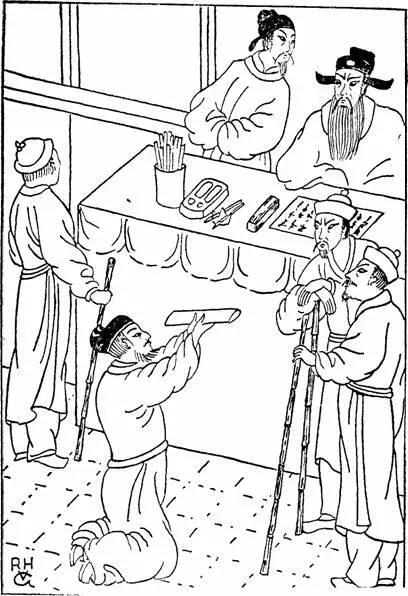
MENG-PIN BEFORE THE BENCH
Koo paused a moment, and wiped the perspiration from his brow. Then he resumed.
"On his way back to town my manager made inquiries in the military guardhouse, located at the crossing of the country road and the highway, and also at the farms and shops along the highway toward the city. But no one had seen a woman alone passing there on horseback that time of the day.
"Therefore this person, greatly fearing that something untoward has befallen his young bride, now respectfully begs your honor to institute a search for her without delay."
Taking a folded document from his sleeve and deferentially raising it above his head with two hands, he added, "I herewith submit a full description of my wife, the clothes she was wearing and the blazed horse she was riding."
The headman took the paper and handed it to judge Dec. He glanced it through, then asked, "Did your wife have any jewels or large sums of money on her person?"
"No, your honor," Koo replied. "My manager asked Dr. Tsao the same question, and he stated that she had only carried a basket with cakes which his wife had given her as a present for me."
Читать дальше
